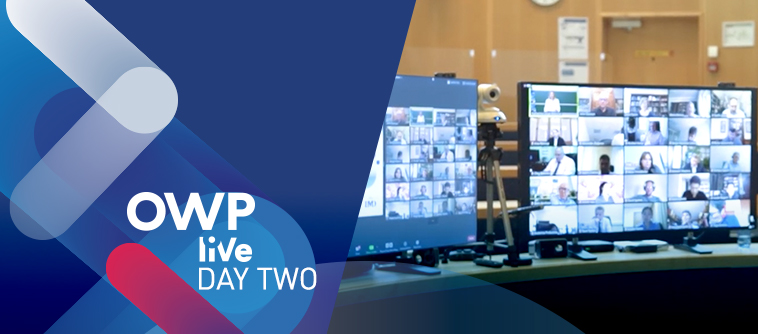
Use autonomy to create resilience in the face of crisis
Make it through the “cash crunch” by focusing on autonomous advice and operations.
Resilience is the umbrella that allows a company to weather the storm of COVID-19.
Be customer-centric and focus on tackling people’s real problems with real solutions, said Professor Howard Yu, LEGO Professor of Management and Innovation at IMD and Director, Advanced Management Program (AMP).
“Certain companies have used autonomy to absorb the shocks and bounce forward rather than backward,” said Howard Yu. “Some succeeding now have disassembled the pyramid business model and transitioned to a ‘flock of birds’ approach that allows extreme flexibility with micro-enterprises.”
Watch the highlights of Professor Yu’s session here.
How Massive Collective Intelligence can drive insight and engagement in your organization
This is the moment to employ Massive Collective Intelligence (MCI), argued Cyril Bouquet and Mark Greeven, professors of innovation and strategy at IMD.
MCI allows leaders to compile individual ideas and opinions from large groups of people to uncover pattern sets and structures invisible to human eyes and minds. MCI can involve a greater range of experts and allows leaders to maximise engagement and make all stakeholders feel that they are part of the journey.
However do not confuse collective intelligence and collective decisions – MCI does not mean corporate democracy. Leaders must still weigh the pros and cons of each idea, but this should be conducted in a transparent way between top management. This group should then offer feedback to all employees and stakeholders.
Watch the highlights of Professor Greeven and Professor Bouquet’s session here.
Remoulding the traditional banking sphere
Digital transformation is as much about cultural overhaul as APIs, says DBS Bank digital executive
Jitendra Tekchandani, Executive Director, Digital & Ecosystem Banking at DBS Bank said of his company’s digital journey: “We quickly realised that collaboration was our way forward and so we needed an ecosystem – a set of partners and platforms.”
He was fed questions by James Henderson, Professor of Strategic Management at IMD during a virtual “in-company visit” at OWP live.
Tekchandani gave an overview of the digital transformation of the bank, which happened in response to an influx of Fintech players coming into the traditional banking space.
Why collaborate? Because customers want digital banking but also spend a lot of time on other platforms. DBS’ platforms enable you to book airline tickets and hotel stays.
“The number of APIs [application programming interfaces, software intermediaries that allow two applications to talk to each other] you have doesn’t matter.” Equally important are matters of governance, operations and the often-neglected area of culture.
Don’t rely on NPS to gauge customer satisfaction
Net Promoter Score (NPS) is prone to rigging and should only be deployed alongside other tools to measure customer satisfaction, Professor of Marketing and Strategy Frédéric Dalsace said.
In a Spaghetti Western-themed session, “Net promoter score (NPS): the good, the bad and the ugly”, Dalsace praised NPS for its simplicity, scalability and its effectiveness for benchmarking.
However, he said it also wasted information, was time and culture sensitive and lacked depth. Worse still, it was easy to rig.
“NPS is a victim of its own success,” he said. “But don’t throw the baby away with the bathwater. Keep the good but, boy, you have to work on the bad and the ugly.”
He offered six remedies: try variations, add questions, use other sources, control for drift and examine the trends.
To thrive after the COVID crisis, you must react quickly but also transform your organization
Organizations must be ambidextrous, said Michael Watkins, Professor of Leadership and Organizational Change at IMD in his talk “Plan now to thrive after the crisis”.
In other words, leaders must ensure that their team can operate in two modes. “This means you must react to something that is happening, but simultaneously engage in transforming your organization,” even in the midst of a crisis.
Watkins was joined by Eugene Woods, President and CEO of Atrium Health, one of the largest healthcare organisations in the US, with 36 hospitals and an annual net revenue of more than $11 billion.
“Atrium has been great at balancing those polarities,” Watkins said, as he and Woods talked OWP attendees through the organization’s reaction to COVID-19 – from shutting down elective surgeries to adopting a virtual care platform in a week – a process that would have taken months in normal times, Woods said. Impressed with the efficiency and efficacy of the new platform, Atrium is now re-examining how its call centers work.
Digital is so deeply embedded in Chinese society that it is integrated into most aspects of daily life
Brimming with real-life examples of companies that “did digitalization right”, IMD Professor of Innovation and Strategy Mark Greeven led a session on digital China, pointing out that even the Chinese Communist Party has gone digital.
The country has three types of organizations that make up its own highly competitive and creative parallel universe: the tech giants with their own ecosystems like Alibaba; the digital challengers like TikTok that uncover one unmet consumer need and tackle it exclusively; and the Chinese celebrity CEOs that have a cult-like following.
Professor Greeven believes that we can see the future – simply by looking at digital China.
“Think in terms of business ecosystems,” he said. “And then look at Chinese companies to improve your UX, specifically how they have thrived in such a highly competitive environment.”
By drawing valuable insights from China, we can all improve our digital capability and gain competitive advantage.
How sustainability issues are rapidly changing the business landscape
Long gone are the days when sustainability was a nice-to-have, said Peter Bakker who believes that companies have the capacity to heal the world but is unsure whether they will react quickly enough.
In an interconnected world with huge vulnerabilities as epitomized by the pandemic, the sustainability agenda has become inseparable from overall company strategy, said Peter Bakker, President & CEO of the World Business Council for Sustainable Development (WBCSD).
Speaking in his keynote address at OWP liVe he said, “The sustainability agenda is no longer ‘let’s change the world’. Sustainability will become the crucial driver of the competitivity of your company.” That, he said, is going to be the reason to get on board.
He urged companies to integrate sustainability into the cost of capital calculations in order to see an acceleration towards a more sustainable world.
Business as usual is over and, with it, sustainability as usual
For too long, a common complaint when it comes to sustainability was “if only the CEO got it”. Leaders must now decouple the sustainability agenda from the figure of the inspired leader and frame it in terms of how the cost of capital will drive lower if you are more sustainable.
In a sobering message to business leaders, Bakker warned: “If you do not lead, we will all fail. In the past, if you could read a balance sheet you would make an OK leader. Today, you need to understand the environmental pressures. A much broader set of skills is going to be required.”



